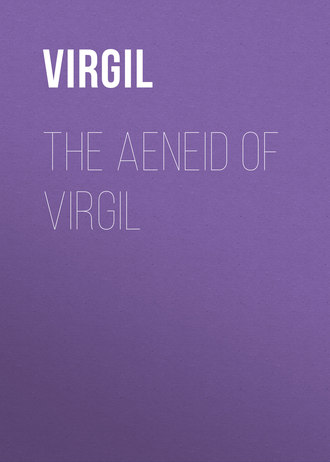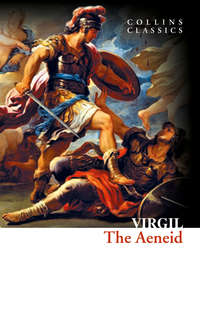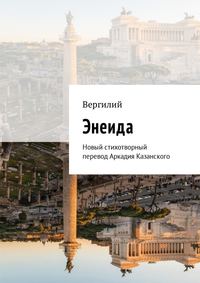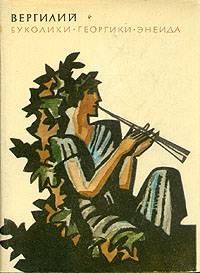 полная версия
полная версияThe Aeneid of Virgil
'"Son, what overmastering pain thus wakes thy wrath? Why ravest thou? or whither is thy care for us fled? Wilt thou not first look to it, where thou hast left Anchises, thine aged worn father; or if Creüsa thy wife and the child Ascanius survive? round about whom all the Greek battalions range; and without my preventing care, the flames ere this had made them their portion, and the hostile sword drunk their blood. Not the hated face of the Laconian woman, Tyndarus' daughter; not Paris is to blame; the gods, the gods in anger overturn this magnificence, and make Troy topple down. Look, for all the cloud that now veils thy gaze and dulls mortal vision with damp encircling mist, I will rend from before thee. Fear thou no commands of thy mother, nor refuse to obey her counsels. Here, where thou seest sundered piles of masonry and rocks violently torn from rocks, and smoke eddying mixed with dust, Neptune with his great trident shakes wall and foundation out of their places, and upturns all the city from her base. Here Juno in all her terror holds the Scaean gates at the entry, and, girt with steel, calls her allied army furiously from their ships. . . . Even now on the citadel's height, look back! Tritonian Pallas is planted in glittering halo and Gorgonian terror. Their lord himself pours courage and prosperous strength on the Grecians, himself stirs the gods against the arms of Dardania. Haste away, O son, and put an end to the struggle. I will never desert thee; I will set thee safe in the courts of thy father's house."
'She ended, and plunged in the dense blackness of the night. Awful faces shine forth, and, set against Troy, divine majesties . . .
'Then indeed I saw all Ilium sinking in flame, and Neptunian Troy uprooted from her base: even as an ancient ash on the mountain heights, hacked all about with steel and fast-falling axes, when husbandmen emulously strain to cut it down: it hangs threateningly, with shaken top and quivering tresses asway; till gradually, overmastered with wounds, it utters one last groan, and rending itself away, falls in ruin along the ridge. I descend, and under a god's guidance clear my way between foe and flame; weapons give ground before me, and flames retire.
'And now, when I have reached the courts of my ancestral dwelling, our home of old, my father, whom it was my first desire to carry high into the hills, and whom first I sought, declines, now Troy is rooted out, to prolong his life through the pains of exile.
'"Ah, you," he cries, "whose blood is at the prime, whose strength stands firm in native vigour, do you take your flight. . . . Had the lords of heaven willed to prolong life for me, they should have preserved this my home. Enough and more is the one desolation we have seen, survivors of a captured city. Thus, oh thus salute me and depart, as a body laid out for burial. Mine own hand shall find me death: the foe will be merciful and seek my spoils: light is the loss of a tomb. This long time hated of heaven, I uselessly delay the years, since the father of gods and king of men blasted me with wind of thunder and scathe of flame."
'Thus held he on in utterance, and remained obstinate. We press him, dissolved in tears, my wife Creüsa, Ascanius, all our household, that our father involve us not all in his ruin, and add his weight to the sinking scale of doom. He refuses, and keeps seated steadfast in his purpose. Again I rush to battle, and choose death in my misery. For what had counsel or chance yet to give? Thoughtest thou my feet, O father, could retire and abandon thee? and fell so unnatural words from a parent's lips? "If heaven wills that naught be left of our mighty city, if this be thy planted purpose, thy pleasure to cast in thyself and thine to the doom of Troy; for this death indeed the gate is wide, and even now Pyrrhus will be here newly bathed in Priam's blood, Pyrrhus who slaughters the son before the father's face, the father upon his altars. For this was it, bountiful mother, thou dost rescue me amid fire and sword, to see the foe in my inmost chambers, and Ascanius and my father, Creüsa by their side, hewn down in one another's blood? My arms, men, bring my arms! the last day calls on the conquered. Return me to the Greeks; let me revisit and renew the fight. Never to-day shall we all perish unavenged."
'Thereat I again gird on my sword, and fitting my left arm into the clasps of the shield, strode forth of the palace. And lo! my wife clung round my feet on the threshold, and held little Iülus up to his father's sight. "If thou goest to die, let us too hurry with thee to the end. But if thou knowest any hope to place in arms, be this household thy first defence. To what is little Iülus and thy father, to what am I left who once was called thy wife?"
'So she shrieked, and filled all the house with her weeping; when a sign arises sudden and marvellous to tell. For, between the hands and before the faces of his sorrowing parents, lo! above Iülus' head there seemed to stream a light luminous cone, and a flame whose touch hurt not to flicker in his soft hair and play round his brows. We in a flutter of affright shook out the blazing hair and quenched the holy fires with spring water. But lord Anchises joyfully upraised his eyes; and stretching his hands to heaven: "Jupiter omnipotent," he cries, "if thou dost relent at any prayers, look on us this once alone; and if our goodness deserve it, give thine aid hereafter, O lord, and confirm this thine omen."
'Scarcely had the aged man spoken thus, when with sudden crash it thundered on the left, and a star gliding through the dusk shot from heaven drawing a bright trail of light. We watch it slide over the palace roof, leaving the mark of its pathway, and bury its brilliance in the wood of Ida; the long drawn track shines, and the region all about fumes with sulphur. Then conquered indeed my father rises to address the gods and worship the holy star. "Now, now delay is done with: I follow, and where you lead, I come. Gods of my fathers, save my house, save my grandchild. Yours is this omen, and in your deity Troy stands. I yield, O my son, and refuse not to go in thy company."
'He ended; and now more loudly the fire roars along the city, and the burning tides roll nearer. "Up then, beloved father, and lean on my neck; these shoulders of mine will sustain thee, nor will so dear a burden weigh me down. Howsoever fortune fall, one and undivided shall be our peril, one the escape of us twain. Little Iülus shall go along with me, and my wife follow our steps afar. You of my household, give heed to what I say. As you leave the city there is a mound and ancient temple of Ceres lonely on it, and hard by an aged cypress, guarded many years in ancestral awe: to this resting-place let us gather from diverse quarters. Thou, O father, take the sacred things and the household gods of our ancestors in thine hand. For me, just parted from the desperate battle, with slaughter fresh upon me, to handle them were guilt, until I wash away in a living stream the soilure. . . ." So spoke I, and spread over my neck and broad shoulders a tawny lion-skin for covering, and stoop to my burden. Little Iülus, with his hand fast in mine, keeps uneven pace after his father. Behind my wife follows. We pass on in the shadows. And I, lately moved by no weapons launched against me, nor by the thronging bands of my Grecian foes, am now terrified at every breath, startled by every noise, thrilling with fear alike for my companion and my burden.
'And now I was nearing the gates, and thought I had outsped all the way; when suddenly the crowded trampling of feet came to our ears, and my father, looking forth into the darkness, cries: "My son, my son, fly; they draw near. I espy the gleaming shields and the flicker of brass." At this, in my flurry and confusion, some hostile god bereft me of my senses. For while I plunge down byways, and swerve from where the familiar streets ran, Creüsa, alas! whether, torn by fate from her unhappy husband, she stood still, or did she mistake the way, or sink down outwearied? I know not; and never again was she given back to our eyes; nor did I turn to look for my lost one, or cast back a thought, ere we were come to ancient Ceres' mound and hallowed seat; here at last, when all gathered, one was missing, vanished from her child's and her husband's company. What man or god did I spare in frantic reproaches? or what crueller sight met me in our city's overthrow? I charge my comrades with Ascanius and lord Anchises, and the gods of Teucria, hiding them in the winding vale. Myself I regain the city, girding on my shining armour; fixed to renew every danger, to retrace my way throughout Troy, and fling myself again on its perils. First of all I regain the walls and the dim gateway whence my steps had issued; I scan and follow back my footprints with searching gaze in the night. Everywhere my spirit shudders, dismayed at the very silence. Thence I pass on home, if haply her feet (if haply!) had led her thither. The Grecians had poured in, and filled the palace. The devouring fire goes rolling before the wind high as the roof; the flames tower over it, and the heat surges up into the air. I move on, and revisit the citadel and Priam's dwelling; where now in the spacious porticoes of Juno's sanctuary, Phoenix and accursed Ulysses, chosen sentries, were guarding the spoil. Hither from all quarters is flung in masses the treasure of Troy torn from burning shrines, tables of the gods, bowls of solid gold, and raiment of the captives. Boys and cowering mothers in long file stand round. . . . Yes, and I dared to cry abroad through the darkness; I filled the streets with calling, and again and yet again with vain reiterance cried piteously on Creüsa. As I stormed and sought her endlessly among the houses of the town, there rose before mine eyes a melancholy phantom, the ghost of very Creüsa, in likeness larger than her wont. I was motionless; my hair stood up, and the accents faltered on my tongue. Then she thus addressed me, and with this speech allayed my distresses: "What help is there in this mad passion of grief, sweet my husband? not without divine influence does this come to pass: nor may it be, nor does the high lord of Olympus allow, that thou shouldest carry Creüsa hence in thy company. Long shall be thine exile, and weary spaces of sea must thou furrow through; and thou shalt come to the land Hesperia, where Lydian Tiber flows with soft current through rich and populous fields. There prosperity awaits thee, and a kingdom, and a king's daughter for thy wife. Dispel these tears for thy beloved Creüsa. Never will I look on the proud homes of the Myrmidons or Dolopians, or go to be the slave of Greek matrons, I a daughter of Dardania, a daughter-in-law of Venus the goddess. . . . But the mighty mother of the gods keeps me in these her borders. And now farewell, and still love thy child and mine." This speech uttered, while I wept and would have said many a thing, she left me and retreated into thin air. Thrice there was I fain to lay mine arms round her neck; thrice the vision I vainly clasped fled out of my hands, even as the light breezes, or most like to fluttering sleep. So at last, when night is spent, I revisit my comrades.
'And here I find a marvellous great company, newly flocked in, mothers and men, a people gathered for exile, a pitiable crowd. From all quarters they are assembled, ready in heart and fortune, to whatsoever land I will conduct them overseas. And now the morning star rose over the high ridges of Ida, and led on the day; and the Grecians held the gateways in leaguer, nor was any hope of help given. I withdrew, and raising my father up, I sought the mountain.'
BOOK THIRD
THE STORY OF THE SEVEN YEARS' WANDERING
'After heaven's lords pleased to overthrow the state of Asia and Priam's guiltless people, and proud Ilium fell, and Neptunian Troy smokes all along the ground, we are driven by divine omens to seek distant places of exile in waste lands. Right under Antandros and the mountains of Phrygian Ida we build a fleet, uncertain whither the fates carry us or where a resting-place is given, and gather the people together. Scarcely had the first summer set in, when lord Anchises bids us spread our sails to fortune, and weeping I leave the shores and havens of my country, and the plains where once was Troy. I sail to sea an exile, with my comrades and son and the gods of household and state.
'A land of vast plains lies apart, the home of Mavors, in Thracian tillage, and sometime under warrior Lycurgus' reign; friendly of old to Troy, and their gods in alliance while our fortune lasted. Hither I pass, and on the winding shore I lay under thwarting fates the first foundations of a city, and from my own name fashion its name, Aeneadae.
'I was paying sacrifice to my mother, daughter of Dione, and to all the gods, so to favour the work begun, and slew a shining bull on the shore to the high lord of the heavenly people. Haply there lay a mound hard at hand, crowned with cornel thickets and bristling dense with shafts of myrtle. I drew near; and essaying to tear up the green wood from the soil, that I might cover the altar with leafy boughs, I see a portent ominous and wonderful to tell. For from the first tree whose roots are rent away and broken from the ground, drops of black blood trickle, and gore stains the earth. An icy shudder shakes my limbs, and my blood curdles chill with terror. Yet from another I go on again to tear away a tough shoot, fully to fathom its secret; yet from another black blood follows out of the bark. With many searchings of heart I prayed the woodland nymphs, and lord Gradivus, who rules in the Getic fields, to make the sight propitious as was meet and lighten the omen. But when I assail a third spearshaft with a stronger effort, pulling with knees pressed against the sand; shall I speak or be silent? from beneath the mound is heard a pitiable moan, and a voice is uttered to my ears: "Woe's me, why rendest thou me, Aeneas? spare me at last in the tomb, spare pollution to thine innocent hands. Troy bore me; not alien to thee am I, nor this blood that oozes from the stem. Ah, fly the cruel land, fly the greedy shore! For I am Polydorus; here the iron harvest of weapons hath covered my pierced body, and shot up in sharp javelins." Then indeed, borne down with dubious terror, I was motionless, my hair stood up, and the accents faltered on my tongue.
'This Polydorus once with great weight of gold had hapless Priam sent in secret to the nurture of the Thracian king, when now he was losing trust in the arms of Dardania, and saw his city leaguered round about. The king, when the Teucrian power was broken and fortune withdrew, following Agamemnon's estate and triumphant arms, severs every bond of duty; murders Polydorus, and lays strong hands on the gold. O accursed hunger of gold, to what dost thou not compel human hearts! When the terror left my senses, I lay the divine tokens before the chosen princes of the people, with my father at their head, and demand their judgment. All are of one mind, to leave the guilty land, and abandoning a polluted home, to let the gales waft our fleets. So we bury Polydorus anew, and the earth is heaped high over his mound; altars are reared to his ghost, sad with dusky chaplets and black cypress; and around are the Ilian women with hair unbound in their fashion. We offer bubbling bowls of warm milk and cups of consecrated blood, and lay the spirit to rest in her tomb, and with loud voice utter the last call.
'Thereupon, so soon as ocean may be trusted, and the winds leave the seas in quiet, and the soft whispering south wind calls seaward, my comrades launch their ships and crowd the shores. We put out from harbour, and lands and towns sink away. There lies in mid sea a holy land, most dear to the mother of the Nereids and Neptune of Aegae, which strayed about coast and strand till the Archer god in his affection chained it fast from high Myconos and Gyaros, and made it lie immoveable and slight the winds. Hither I steer; and it welcomes my weary crew to the quiet shelter of a safe haven. We disembark and worship Apollo's town. Anius the king, king at once of the people and priest of Phoebus, his brows garlanded with fillets and consecrated laurel, comes to meet us; he knows Anchises, his friend of old; we clasp hands in welcome, and enter his palace. I worshipped the god's temple, an ancient pile of stone. "Lord of Thymbra, give us an enduring dwelling-place; grant a house and family to thy weary servants, and a city to abide: keep Troy's second fortress, the remnant left of the Grecians and merciless Achilles. Whom follow we? or whither dost thou bid us go, where fix our seat? Grant an omen, O lord, and inspire our minds."
'Scarcely had I spoken thus; suddenly all seemed to shake, all the courts and laurels of the god, the whole hill to be stirred round about, and the cauldron to moan in the opening sanctuary. We sink low on the ground, and a voice is borne to our ears: "Stubborn race of Dardanus, the same land that bore you by parentage of old shall receive you again on her bountiful breast. Seek out your ancient mother; hence shall the house of Aeneas sway all regions, his children's children and they who shall be born of them." Thus Phoebus; and mingled outcries of great gladness uprose; all ask, what is that city? whither calls Phoebus our wandering, and bids us return? Then my father, unrolling the records of men of old, "Hear, O princes," says he, "and learn your hopes. In mid ocean lies Crete, the island of high Jove, wherein is mount Ida, the cradle of our race. An hundred great towns are inhabited in that opulent realm; from it our forefather Teucer of old, if I recall the tale aright, sailed to the Rhoetean coasts and chose a place for his kingdom. Not yet was Ilium nor the towers of Pergama reared; they dwelt in the valley bottoms. Hence came our Lady, haunter of Cybele, the Corybantic cymbals and the grove of Ida; hence the rites of inviolate secrecy, and the lions yoked under the chariot of their mistress. Up then, and let us follow where divine commandments lead; let us appease the winds, and seek the realm of Gnosus. Nor is it a far journey away. Only be Jupiter favourable, the third day shall bring our fleet to anchor on the Cretan coast." So spoke he, and slew fit sacrifice on the altars, a bull to Neptune, a bull to thee, fair Apollo, a black sheep to Tempest, a white to the prosperous West winds.
'Rumour flies that Idomeneus the captain is driven forth of his father's realm, and the shores of Crete are abandoned, that the houses are void of foes and the dwellings lie empty to our hand. We leave the harbour of Ortygia, and fly along the main, by the revel-trod ridges of Naxos, by green Donusa, Olearos and snow-white Paros, and the sea-strewn Cyclades, threading the racing channels among the crowded lands. The seamen's clamour rises in emulous dissonance; each cheers his comrade: Seek we Crete and our forefathers. A wind rising astern follows us forth on our way, and we glide at last to the ancient Curetean coast. So I set eagerly to work on the walls of my chosen town, and call it Pergamea, and exhort my people, joyful at the name, to cherish their homes and rear the castle buildings. And even now the ships were drawn up on the dry beach; the people were busy in marriages and among their new fields; I was giving statutes and homesteads; when suddenly from a tainted space of sky came, noisome on men's bodies and pitiable on trees and crops, pestilence and a year of death. They left their sweet lives or dragged themselves on in misery; Sirius scorched the fields into barrenness; the herbage grew dry, and the sickly harvest denied sustenance. My father counsels to remeasure the sea and go again to Phoebus in his Ortygian oracle, to pray for grace and ask what issue he ordains to our exhausted state; whence he bids us search for aid to our woes, whither bend our course.
'Night fell, and sleep held all things living on the earth. The sacred images of the gods and the household deities of Phrygia, that I had borne with me from Troy out of the midst of the burning city, seemed to stand before mine eyes as I lay sleepless, clear in the broad light where the full moon poured through the latticed windows; then thus addressed me, and with this speech allayed my distresses: "What Apollo hath to tell thee when thou dost reach Ortygia, he utters here, and sends us unsought to thy threshold. We who followed thee and thine arms when Dardania went down in fire; we who under thee have traversed on shipboard the swelling sea; we in like wise will exalt to heaven thy children to be, and give empire to their city. Do thou prepare a mighty town for a mighty people, nor draw back from the long wearisome chase. Thou must change thy dwelling. Not to these shores did the god at Delos counsel thee, or Apollo bid thee find rest in Crete. There is a region Greeks name Hesperia, an ancient land, mighty in arms and foison of the clod; Oenotrian men dwell therein; now rumour is that a younger race have called it Italy after their captain's name. This is our true dwelling place; hence is Dardanus sprung, and lord Iasius, the first source of our race. Up, arise, and tell with good cheer to thine aged parent this plain tale, to seek Corythus and the lands of Ausonia. Jupiter denies thee the Dictaean fields."
'Astonished at this vision and divine utterance (nor was that slumber; but openly I seemed to know their countenances, their veiled hair and gracious faces, and therewith a cold sweat broke out all over me) I spring from my bed and raise my voice and upturned hands skyward and pay pure offering on the hearth. The sacrifice done, I joyfully tell Anchises, and relate all in order. He recognises the double descent and twofold parentage, and the later wanderings that had deceived him among ancient lands. Then he speaks: "O son, hard wrought by the destinies of Ilium, Cassandra only foretold me this fortune. Now I recall how she prophesied this was fated to our race, and often cried of Hesperia, often of an Italian realm. But who was to believe that Teucrians should come to Hesperian shores? or whom might Cassandra then move by prophecy? Yield we to Phoebus, and follow the better way he counsels." So says he, and we all rejoicingly obey his speech. This dwelling likewise we abandon; and leaving some few behind, spread our sails and run over the waste sea in our hollow wood.
'After our ships held the high seas, nor any land yet appears, the sky all round us and all round us the deep, a dusky shower drew up overhead carrying night and tempest, and the wave shuddered and gloomed. Straightway the winds upturn the main, and great seas rise; we are tossed asunder over the dreary gulf. Stormclouds enwrap the day, and rainy gloom blots out the sky; out of the clouds bursts fire fast upon fire. Driven from our course, we go wandering on the blind waves. Palinurus himself professes he cannot tell day from night on the sky, nor remember the way amid the waters. Three dubious days of blind darkness we wander on the deep, as many nights without a star. Not till the fourth day was land at last seen to rise, discovering distant hills and sending up wreaths of smoke. The sails drop; we swing back to the oars; without delay the sailors strongly toss up the foam, and sweep through the green water. The shores of the Strophades first receive me thus won from the waves, Strophades the Greek name they bear, islands lying in the great Ionian sea, which boding Celaeno and the other Harpies inhabit since Phineus' house was shut on them, and they fled in terror from the board of old. Than these no deadlier portent nor any fiercer plague of divine wrath hath issued from the Stygian waters; winged things with maidens' countenance, bellies dropping filth, and clawed hands and faces ever wan with hunger. . . .
'When borne hitherward we enter the haven, lo! we see goodly herds of oxen scattered on the plains, and goats flocking untended over the grass. We attack them with the sword, and call the gods and Jove himself to share our spoil. Then we build seats on the winding shore and banquet on the dainty food. But suddenly the Harpies are upon us, swooping awfully from the mountains, and shaking their wings with loud clangour, plunder the feast, and defile everything with unclean touch, spreading a foul smell, and uttering dreadful cries. Again, in a deep recess under a caverned rock, shut in with waving shadows of woodland, we array the board and renew the altar fires; again, from their blind ambush in diverse quarters of the sky, the noisy crowd flutter with clawed feet around their prey, defiling the feast with their lips. Then I bid my comrades take up arms, and proclaim war on the accursed race. Even as I bade they do, range their swords in cover among the grass, and hide their shields out of sight. So when they swooped clamorously down along the winding shore, Misenus from his watch-tower on high signals on the hollow brass; my comrades rush in and essay the strange battle, to set the stain of steel on the winged horrors of the sea. But they take no violence on their plumage, nor wounds on their bodies; and soaring into the firmament with rapid flight, leave their foul traces on the spoil they had half consumed. Celaeno alone, prophetess of ill, alights on a towering cliff, and thus breaks forth in deep accents:








